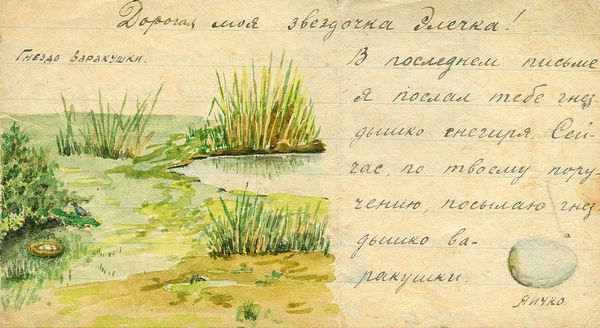
I reviewed Olivier Rolin’s new book for The Daily Telegraph
750,000 shot. This figure is exact; the Soviet secret police, the NKVD, kept meticulous records relating to their activities during Stalin’s Great Purge. How is anyone to encompass in words this horror, barely 80 years old? Some writers find the one to stand for the all: an Everyman to focus the reader’s horror and pity. Olivier Rolin found his when he was shown drawings and watercolours made by Alexey Wangenheim, an inmate of the Solovki prison camp in Russia’s Arctic north. He made them for his daughter, and they are reproduced as touching miniatures in this slim, devastating book, part travelogue, part transliteration of Wangenheim’s few letters home.
While many undesirables were labelled by national or racial identity, a huge number were betrayed by their accomplishments. Before he was denounced by a jealous colleague, Wangenheim ran a pan-Soviet weather service. He was not an exceptional scientist: more an efficient bureaucrat. He cannot even be relied on “to give colourful descriptions of the glories of nature” before setting sail, with over a thousand others, for a secret destination, not far outside the town of Medvezhegorsk. There, some time around October 1937, a single NKVD officer dispatched the lot of them, though he had help with the cudgelling, the transport, the grave-digging. While he went to work with his Nagant pistol, others were washing blood and brains off the trucks and tarpaulins.
Right to the bitter end, Wangenheim is a boring correspondent, always banging on about the Party. “My faith in the Soviet authorities has in no way been shaken” he says. “Has Comrade Stalin received my letter?” And again: “I have battled in my heart not to allow myself to think ill of the Soviet authorities or of the leaders”. Rolin makes gold of such monotony, exploiting the degree to which French lends itself to lists and repeated figures, and his translator Ros Schwartz has rendered these into English that is not just palatable, but often thrilling and always freighted with dread.
When Wangenheim is not reassuring his wife about the Bolshevik project, he is making mosaics out of stone chippings and brick dust: meticulous little portraits of — of all people — Stalin. Rolin openly struggles to understand his subject’s motivation: “In any case, blinkeredness or pathetic cunning, there is something sinister about seeing this man, this scholar, making of his own volition the portrait of the man in whose name he is being crucified.”
That Rolin finds a mystery here is of a piece with his awkward nostalgia for the promise of the Bolshevik revolution. Hovering like a miasma over some pages (though Rolin is too smart to succumb utterly) is that hoary old meme, “the revolution betrayed”. So let us be clear: the revolution was not betrayed. The revolution panned out exactly the way it was always going to pan out, whether Stalin was at the helm or not. It is also exactly the way the French revolution panned out, and for exactly the same reason.
Both French and Socialist revolutions sought to reinvent politics to reflect the imminent unification of all branches of human knowledge, and consequently, their radical simplification. By Marx’s day this idea, under the label “scientism”, had become yawningly conventional: also wrong.
Certainly by the time of the Bolshevik revolution, scientists better than Wangenheim — physicists, most famously — knew that the universe would not brook such simplification, neither under Marx nor under any other totalising system. Rationality remains a superb tool with which to investigate the world. But as a working model of the world, guiding political action, it leads only to terror.
To understand Wangenheim’s mosaic-making, we have to look past his work, diligently centralising and simplifying his own meteorological science to the point where a jealous colleague, deprived of his sinecure, denounced him. We need to look at the human consequences of this attempt at scientific government, and particularly at what radical simplification does to the human psyche. To order and simplify life is to bureaucratise it, and to bureaucratise human beings is make them behave like machines. Rolin says Wangenheim clung to the party for the sake of his own sanity. I don’t doubt it. But to cling to any human institution, or to any such removed and fortressed individual, is the act, not of a suffering human being but of a malfunctioning machine.
At the end of his 1940 film The Great Dictator Charles Chaplin, dressed in Adolf Hitler’s motley, broke the fourth wall to declare war on the “machine men with machine minds” that were then marching roughshod across his world. Regardless of Hitler’s defeat, this was a war we assuredly lost. To be sure the bureaucratic infection, like all infections, has adapted to ensure its own survival, and it is not so virulent as it was. The pleasures of bureaucracy are more evident now; its damages, though still very real, are less evident. “Disruption” has replaced the Purge. The Twitter user has replaced the police informant.
But let us be explicit here, where Rolin has been admirably artful and quietly insidious: the pleasures of bureaucracy in both eras are exactly the same. Wangenheim’s murderers lived in a world that had been made radically simple for them. In Utopia, all you have to do is your job (though if you don’t, Utopia falls apart). These men weren’t deprived of humanity: they were relieved of it. They experienced exactly what you or I feel when the burden of life’s ambiguities is lifted of a sudden from our shoulders: contentment, bordering on joy.
